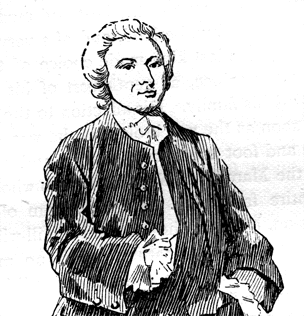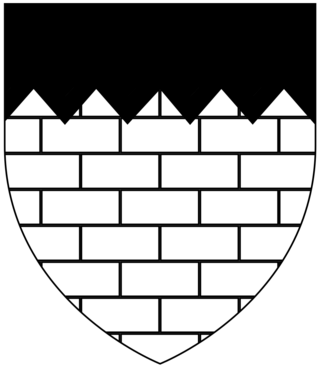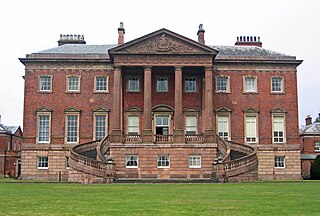
Baron Macdonald, of Slate in the County of Antrim, is a title in the Peerage of Ireland. It was created in 1776 for Sir Alexander Macdonald, 9th Baronet, of Sleat. The Macdonald family of Sleat descends from Uisdean Macdonald, also known as Hugh of Sleat, or Hugh Macdonald, who was an illegitimate son of Alexander Macdonald, Earl of Ross. On 28 May 1625, his great-great-great-great-grandson Donald Gorm Og Macdonald was created a baronet, of Sleat in the Isle of Skye in the County of Inverness, in the Baronetage of Nova Scotia. The baronetcy was created with remainder to heirs male whatsoever and with a special clause of precedence which provided that it should have precedency over all former baronets.
The title of Duke of Gramont is a French dukedom and former peerage. It was created in 1648 for French Marshal Antoine III de Gramont.
This is a list of people who have served as Custos Rotulorum of Denbighshire.

Baron Widdrington, of Blankney in the County of Lincoln, was a title in the Peerage of England. It was created on 2 November 1643 for Sir William Widdrington, 1st Baronet. He had already been created a baronet, of Widdrington in the County of Northumberland, in the Baronetage of England on 9 July 1642. The Widdringtons were an ancient Northumbrian family who gave their name to the village, near Morpeth, Northumberland. In the 17th century the family were strongly Royalist. William Widdrington, 4th Baron Widdrington, joined Derwentwater and other Northumberland families in the Jacobite rising of 1715 and was captured at the Battle of Preston (1715). As a consequence of the subsequent attainder of the brothers, the Widdrington estates were sequestered and sold by the Crown, and the title was forfeited. Of their three great houses no traces now remain: Widdrington Castle was demolished in 1862 ; Stella Hall, Blaydon on Tyne, was demolished in 1954; and Blankney Hall, Lincolnshire suffered the same fate in 1960. Some of the family paintings passed to the Cook/Widdrington family of Newton Hall, and those were auctioned by Christie’s in 2010. The important collection of family portraits passed into the possession of the Towneley family through Mary Widdrington, daughter of the third Baron. These were sold at various auctions after Towneley Hall was emptied in about 1902. A few have since been donated to Towneley Hall, and four were donated to Stonyhurst College in the 19th century.
There have been three baronetcies created for members of the Clerke family. One creation is extant as of 2008.

Sir Peter Leycester, 1st Baronet was an English antiquarian and historian. He was involved in the English Civil War on the royalist side and was subsequently made a baronet. He later compiled one of the earliest histories of the county of Cheshire and as a result of this became involved in a controversy with the Mainwaring family. He developed a library in his home at Tabley Old Hall and made improvements to the house and estate, including building a private chapel in the grounds of the house. He was an active and conscientious justice of the peace and used his position on the Bench to expound his staunchly conservative and Royalist political views.
There have been two baronetcies created for persons with the surname Piers, one in the Baronetage of Nova Scotia, now extinct, and one in the Baronetage of Ireland, extant as of 2018.
Robert Sinclair may refer to:
Wigtownshire was a constituency represented in the Parliament of Scotland until 1707.
The Monins Baronetcy, of Waldershare in the County of Kent, was a title in the Baronetage of England. It was created on 29 June 1611 for William Monins. His son, the second Baronet, was High Sheriff of Kent in 1646. Upon his death his brother Thomas succeeded to the baronetcy but the Waldershare estate passed to his eldest daughter and to Peregrine Bertie whom she married. The baronetcy became extinct on the death of the third Baronet in 1678.
Sir James Mor Macdonald, 9th Laird of Sleat and 2nd Baronet was a Scottish nobleman and soldier.

The Edwardes Baronetcy, of Shrewsbury in the County of Shropshire, was a title in the Baronetage of England. It was created on 21 March 1645 for Thomas Edwardes. It was recreated on 22 April 1678 for his son and successor Francis Edwardes, with special remainders and precedence back to 1645, possibly due to the loss of the original patent. Sir Francis, the 2nd Baronet was Member of Parliament for Shrewsbury 1685–90. In 1734 the 3rd Baronet was succeeded by his cousin Henry who married Eleanor Edwardes daughter of the 3rd Baronet. In 1790 the 6th Baronet was succeeded by Reverend Thomas Edwardes, Rector of Frodesley, Shropshire, great grandson of the 1st Baronet by his 5th son. The 7th Baronet was also Rector of Frodesley. The titles became extinct on the death of the 10th Baronet in 1900.

The Reynell Baronetcy, of Laleham in the County of Middlesex, was a title in the Baronetage of Ireland. It was created on 27 July 1678 for Richard Reynell, subsequently Member of Parliament for Ashburton in Devon, and Lord Chief Justice of the King's Bench in Ireland 1691–1695. The 2nd Baronet, his son, represented the borough of Wicklow in the Irish House of Commons, but in contrast to his father had a generally undistinguished career. The 6th Baronet was a distinguished soldier who fought at the Battle of Waterloo. The title became extinct on his death in 1848. They were a junior branch of the ancient Reynell family of East Ogwell and West Ogwell in Devon.

There have been two baronetcies created for persons with the surname Leicester, both in the Baronetage of England. The fifth Baronet of the second creation was raised to the peerage as Baron de Tabley in 1826. Both the barony and the two baronetcies are now extinct.
Sir Philip Musgrave, 2nd Baronet was an English politician who sat in the House of Commons of England from 1640 to 1643 and from 1661 to 1678. He served in the Royalist army in the Civil War.

Sir Nicholas Slanning, 1st Baronet FRS of Maristow in the parish of Tamerton Foliot, Devon, was an English courtier and politician who sat in the House of Commons between 1667 and 1689.

The Davie Baronetcy, of Creedy in the County of Devon, was a title in the Baronetage of England. It was created on 9 September 1641 for John Davie, the Member of Parliament for Tiverton in 1621–22.
The Dereham Baronetcy, of West Dereham in the County of Norfolk, was a title in the Baronetage of England. It was created on 8 June 1661 for Thomas Dereham. The fourth Baronet was a Fellow of the Royal Society. The title became extinct on his death in 1739.
William Clerke may refer to:
Sir William Thorold, 1st Baronet (1591–1678) was an English landowner and politician who sat in the House of Commons from 1661 to 1677. He fought for the Royalist cause in the English Civil War.








